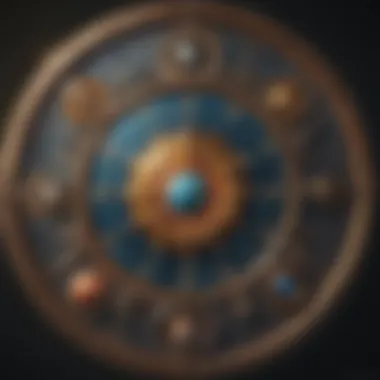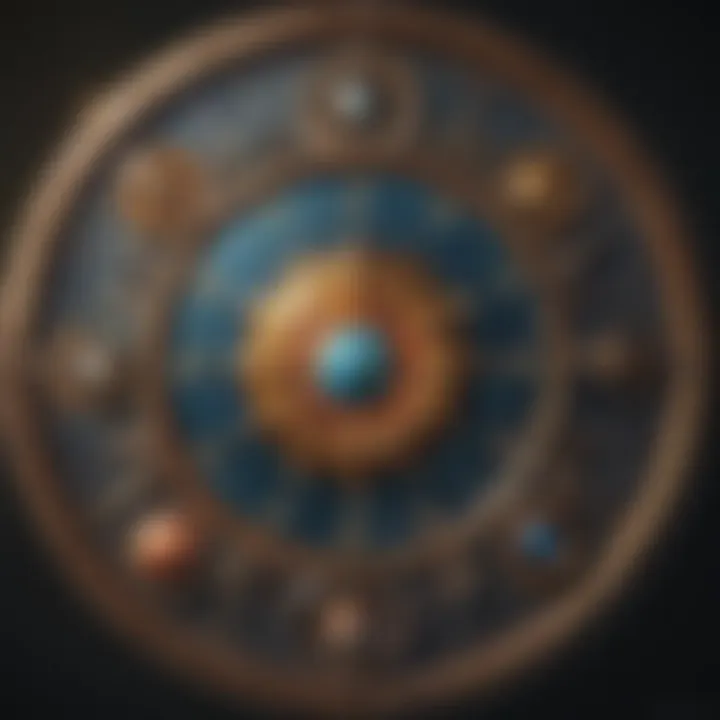Explore the Depths of Your Zodiac Birth Chart


Intro
The universe has its own language. This language speaks to us through the stars, the planets, and the very fabric of our existence. A zodiac birth chart, often referred to as astrology’s blueprint for a person’s life, captures a unique snapshot of the cosmos at the precise moment one enters this world. Understanding your birth chart goes beyond mere curiosity; it delves into the intricate patterns that underpin our motivations, behaviors, and even potential challenges.
By examining the varied components of a birth chart, one uncovers hidden aspects of self that may not be readily visible in everyday life. This exploration not only fosters self-awareness but can also guide us in navigating the experiences life throws our way.
In this piece, we will peel back the layers of astrological knowledge, breaking down key terms and concepts, exploring the rich history of astrology, and diving deep into the significance of each zodiac sign. We will also look at celestial events, dissecting their implications for our personal journeys. By the end, readers will hold a comprehensive understanding of how the stars above can illuminate our paths below.
Astrological Concepts
When we venture into the world of astrology, we enter a realm populated with specific terminology and historical significance that enhances our understanding of a birth chart.
Definition of Key Terms
Several key terms serve as the foundation blocks of astrology. Here’s a cheat sheet:
- Zodiac Signs: The twelve divisions of celestial longitude that correspond to different personality traits.
- Houses: The divisions of a birth chart that represent different areas of life, such as relationships, career, and home.
- Aspects: The angles formed between planets in a chart, influencing how they interact with each other.
Familiarity with these terms is vital, as they serve as the building blocks for interpreting a birth chart's layers.
Historical Background of Astrology
Astrology isn't just a modern fad; it possesses a rich tapestry woven through centuries. Its origins can be traced back to ancient civilizations like Babylon and Egypt, where observers looked to the skies to make sense of earthly events. They believed that the positions of celestial bodies influenced both the individual and the collective experiences of humanity.
Throughout history, different cultures have adopted and adapted astrological practices, leading to diverse interpretations and belief systems. This historical context provides weight to astrology’s relevance today.
Overview of Different Astrology Branches
Astrology isn’t a one-size-fits-all topic; it branches out into various fields:
- Natal Astrology: Focuses on the birth chart as a means for personal understanding.
- Mundane Astrology: Analyzes global events and trends based on celestial movements.
- Horary Astrology: Provides answers based on specific questions cast at the moment they arise.
Understanding these distinctions can empower readers to navigate the astrological landscape more effectively.
Zodiac Signs Exploration
Each zodiac sign carries potent symbolism and distinct personality traits. By delving deeper into each sign, we can further comprehend how they shape individual natures.
In-Depth Analysis of Each Sign
- Aries (March 21 - April 19): Bold, daring, and often fast-moving, Aries individuals are natural leaders.
- Taurus (April 20 - May 20): Known for their steadfastness and reliability, they appreciate comfort and pleasure.
- Gemini (May 21 - June 20): Inquisitive and adaptable, embracing change is second nature to them.
- Cancer (June 21 - July 22): Nurturing and sensitive, they form deep emotional connections.
- Leo (July 23 - August 22): Charismatic and confident, they thrive in the spotlight.
- Virgo (August 23 - September 22): Detail-oriented and analytical, they possess a practical approach to life.
- Libra (September 23 - October 22): Seeking harmony and balance, they are natural diplomats.
- Scorpio (October 23 - November 21): Intense and passionate, they are known for their depth of emotion.
- Sagittarius (November 22 - December 21): Adventurous and free-spirited, they have a thirst for knowledge.
- Capricorn (December 22 - January 19): Disciplined and responsible, they are usually ambitious.
- Aquarius (January 20 - February 18): Independent thinkers, they value originality.
- Pisces (February 19 - March 20): Compassionate and artistic, they are dreamers at heart.
Personality Traits and Characteristics
Each sign sings a unique tune in the grand symphony of the zodiac. The interaction of these signs influences various aspects of personality.
Historical and Mythological Connections
The roots of each zodiac sign are often intertwined with myths and stories. For example, Aries is linked to the ram in Greek mythology, representing sacrifice and leadership. Familiarity with these connections can deepen one's appreciation for their own birth chart.
Celestial Events
Understanding celestial movements can amplify our insights into astrology and personal growth. The vibrancy of cosmic phenomena like solar eclipses, lunar cycles, and planetary retrogrades offers profound influence.
Major Cosmic Phenomena
- Solar Eclipses: Symbolic of new beginnings and shifts in perspective.
- Lunar Phases: Each phase, from the new moon to full moon, offers different energetic qualities.
- Retrogrades: Often viewed with caution, they invite introspection and reevaluation.
Impact of Celestial Events on Astrology
The dance of celestial bodies sends ripples through our lives. The timing of these events can signify auspicious periods for various endeavors.


Rituals and Practices During Celestial Events
Engaging in rituals during significant celestial events allows individuals to connect with the energies at play. This might include journaling, meditation, or specific ceremonies honoring the planets.
"The cosmos is not just a collection of stars; it is a mirror reflecting back the profound mystery of our existence."
As readers embark on this enlightening journey through their zodiac birth chart, the universe offers them a compass to navigate the twists and turns of their life.
Understanding these celestial connections and astrological components not only enriches the interpretation process but also underscores the profound wisdom that astrology can provide. Understanding one's birth chart serves as the first step towards unveiling one's personal mythology.
Prolusion to Zodiac Birth Charts
When it comes to understanding ourselves and our place in the cosmos, few tools are as powerful as a zodiac birth chart. This chart acts like a cosmic roadmap, capturing the positions of celestial bodies at the exact moment of one's birth. It provides a detailed picture of personality tendencies, strengths, weaknesses, and potential life paths. Knowing how to interpret these intricacies can guide individuals toward a deeper self-awareness and personal growth.
A zodiac birth chart, or natal chart, is composed of various elements, including the twelve zodiac signs, planetary influences, and the houses of astrology. Each of these components plays a unique role in shaping an individual’s character and experiences. As such, the significance of birth charts extends beyond mere predictions or entertainment; they serve as personal guides that encourage self-reflection and understanding.
Understanding the dimensions of a birth chart is not just about astrology; it's about gaining insights into who we are. Individuals seeking clarity in complex feelings or crossroads in life often find guidance within their charts. It highlights innate traits and suggests ways to harness hidden potential. For some, it’s a compass guiding them through life's challenges—an opportunity for more than just fleeting knowledge but rather, an enriching experience.
"A birth chart is like a unique fingerprint, offering distinct insights into one’s existence and how to navigate through it."
Exploring how historical perspectives have shaped these interpretations can provide additional depth. The evolution of astrology, with its myriad interpretations and schools of thought, informs how birth charts are utilized today. As people learn more about the characteristics tied to their signs and planetary placements, deeper connections to ancient teachings can emerge.
Overall, delving into the complexities of zodiac birth charts invites exploration and discovery. It encourages us to look at our unique narratives and recognize the overarching patterns of our lives, ultimately positioning oneself at the center of a vast galaxy of possibilities.
Components of a Birth Chart
When we talk about a Zodiac birth chart, we’re not just referring to a series of symbols and diagrams. Instead, we touch upon a complex web of elements that interconnect in myriad ways to reveal insights about oneself. Understanding the components of a birth chart is pivotal for anyone delving into astrology, be they seasoned astrologers or curious newcomers. Each aspect holds its own significance and adds depth to the narrative that the chart tells.
The Twelve Zodiac Signs
The twelve zodiac signs serve as the building blocks of astrology. Each sign embodies its own traits, tendencies, and energies. They encapsulate personality features and can provide guidance on how one interacts with the world.
- Aries – A fire sign often associated with initiative and courage.
- Taurus – An earth sign that signifies stability and patience.
- Gemini – Airy and talkative, Gemini reflects adaptability and curiosity.
- Cancer – Known for emotions and nurturing, Cancer is a water sign.
- Leo – A sign of creativity and leadership, showcasing boldness.
- Virgo – Often linked to practicality and analysis.
- Libra – Concerned with balance and harmony, a sign of partnership.
- Scorpio – Intensity and transformation, embodying deep emotion.
- Sagittarius – Represents adventure and philosophical questing, known for its optimism.
- Capricorn – Associated with discipline and ambition, often taking a serious stance.
- Aquarius – Known for innovation and independence.
- Pisces – The dreamers with deep intuition, reflecting spirituality.
Each sign brings a unique flavor into the mix, and understanding their characteristics can enhance your grasp on personal traits.
Planetary Influences
Beyond the signs, planets in astrology play a crucial role in shaping individual experiences. Each planet possesses distinct meanings and influences that can alter how a sign expresses its energy.
- The Sun symbolizes self-identity and core essence.
- The Moon governs emotions, instincts, and inner life.
- Mercury rules communication styles and reasoning.
- Venus concerns love, beauty, and relationships.
- Mars is associated with action, aggression, and drive.
- Jupiter represents growth, optimism, and fortune.
- Saturn indicates discipline, challenges, and lessons.
- Other planets such as Uranus, Neptune, and Pluto also contribute with their unique qualities.
The interplay among these celestial bodies shapes one's behavior and attitudes, with planetary positions at the time of birth holding particular significance.
Houses in Astrology
The houses of a birth chart are essentially segments that organize different areas of life like a well-drawn map. Each house pertains to various aspects, such as relationships, career, and personal identity. A total of twelve houses exist, and they provide context to how the planetary energies manifest. For instance:
- First House: Self-image and beginnings
- Second House: Material possessions and values
- Third House: Communication and local travel
- Fourth House: Home and family dynamics
The location of planets within these houses further refines the interpretation, illustrating how external factors influence personal circumstances.
Aspects and Angles
Aspects refer to the angles formed between planets, which illustrate the relationships between different energies at play. They’re essential for understanding the dynamics of a birth chart. Some notable aspects include:
- Conjunction: Planets are in close proximity, amplifying their individual energies.
- Opposition: A tension-filled dynamic occurs when planets are 180 degrees apart.
- Trine and Sextile: These angles indicate harmony and support between planets.
Recognizing these intricate relationships helps one discern the way different elements work together or can even clash, shaping life experiences in unique ways.
"Astrology is a language. If you understand this language, the sky speaks to you.”
— Dane Rudhyar
Understanding these components, from the signs to the houses, allows for a comprehensive analysis of a birth chart. Each element builds upon the last, crafting a narrative that holds profound insights into personality, motivations, and potential life paths.


Interpreting Your Birth Chart
Understanding how to interpret your birth chart is like opening a window into your very soul—allowing you to see not just who you are, but why you are the way you are. This intricate map of the cosmos at the moment of your birth serves as a guide for self-exploration. Through interpreting your birth chart, you gain valuable insights that can help inform your decisions and bolster your relationships.
Several specific elements exist within the chart that warrant attention. Emphasizing these key points can enhance your grasp of yourself and those around you. First off, the three major components are the sun sign, moon sign, and rising sign. Each element plays a unique role, and together they weave a rich narrative about your identity and potential life trajectories.
Importantly, interpreting your birth chart also lends perspective on your emotional landscape and relationship dynamics. Considering the positioning of planets and houses helps you make sense of underlying motivations. Thus, delving into your birth chart not only serves personal growth but also fosters empathy for others’ situations.
"Before you can understand others, you must first grasp the complexities within yourself."
Understanding Your Sun Sign
Your sun sign is often the most recognized aspect of astrology—especially in popular culture. It represents your core self and your main identity. The position of the sun at your birth defines how you express your individuality. For instance, a person with a Leo sun might radiate confidence and charm, while a Virgo sun might approach life through a lens of practicality and meticulousness.
When you start to unpack your sun sign, you should assess the traits associated with your sign's element—be it fire, earth, air, or water. Fire signs generally embody passion and energy, while earth signs tend to have grounded and stable natures. Air and water signs, on the other hand, influence communication styles and emotional depths, respectively.
The sun sign is about individuality but also impacts how you connect with others. You may find yourself reflecting on situations in your life where your sun sign traits shine through strongly and how this influences your future pathways.
Role of the Moon Sign
The moon sign delves deeper into emotional realms, giving insight into your instincts, habits, and hidden fears. It’s often described as representing the “inner you”—the driving force behind your reactions and emotional well-being. The moon sign reveals how you nurture yourself and reflect your true needs.
For example, if your moon is in Pisces, you might possess a dreamy, sensitive nature that craves emotional intimacy. A moon in Capricorn, however, may suggest someone who feels the need to establish control and seeks stability even in chaotic situations. This understanding can help you achieve greater emotional balance.
As you consider your moon sign, think of it as a guide for your emotional reactions. Recognizing these inner impulses allows for better coping strategies and richer interpersonal relationships.
The Importance of the Rising Sign
The rising sign, or ascendant, occurs at the eastern horizon at the time of your birth. It serves as your social mask—the way you present yourself to the world and how others perceive you. Often, this is an area of difficulty since it may contrast your sun and moon signs. For instance, a person with a Cancer sun may project an outward persona of an Aries rising. This discrepancy may lead to misunderstandings in social settings.
Unlike the individualistic qualities represented by the sun sign, rising sign attributes often highlight immediate reactions and first impressions. They shape how you approach life’s opportunities and challenges.
Neighbors might see you as charismatic if you have a Libra rising, while others might find a Sagittarius rising to be adventurous and idealistic. Understanding this layer of your birth chart offers profound insight into how you interact and maneuver through your personal and professional journeys.
Astrology and Personality Analysis
Astrology isn't just about predicting the future or reading fortunes; it serves as a window into the personality. Through examining a zodiac birth chart, one can glean profound insights that provide both clarity and guidance. Understanding how various celestial influences interact can lead to more effective self-reflection and personal development. As we delve into personality analysis via astrology, three important aspects come to light: the character traits linked to zodiac signs, the planetary influences on behavior, and the complexities inherent in interpreting these traits.
Character Traits Linked to Zodiac Signs
Different zodiac signs are associated with unique character traits. Each sign carries characteristics that can influence individual behavior, thought patterns, and even emotional responses. For instance:
- Aries tends to be assertive and fearless.
- Taurus is often seen as reliable and practical.
- Gemini can be characterized by versatility and adaptability.
- Leo is frequently linked to leadership and charisma.
These aren't hard and fast rules, but they serve as a base. The energies of these signs can provide a quick reference to understand motivations. Someone with a Mars placement in Leo may exhibit a more exuberant approach to challenges compared to someone with a Mars in Virgo, who may lean towards caution and analysis.
Planetary Influences on Behavior
Not only do zodiac signs play a role, but the planets also significantly contribute to personality traits. Each planet, from Mercury to Pluto, governs certain areas of life and personality. For example:
- Mercury relates to communication and thought processes, shaping how one articulates ideas.
- Venus rules love and aesthetic appreciation, influencing values and preferences in relationships.
- Saturn is often viewed as a teacher, presenting challenges that can foster resilience and discipline.
As one examines their chart, it becomes clear that these planetary placements and aspects can reveal why individuals behave the way they do. Someone with a strong Venus influence may seek harmony and beauty, while a heavily placed Saturn might lead to a serious demeanor at times.
Complexities in Personality Interpretation
While astrology provides a framework for understanding personality, it’s essential to recognize its limitations and complexities. No individual can be reduced solely to their sun sign or planetary placements. Factors such as life experience, cultural background, and personal choices layer upon these astrological insights.
For instance, two individuals born under the same sign may express those traits differently due to varying planetary influences or personal circumstances. A Cancer nurtured in an emotionally supportive environment may display their traits of sensitivity and empathy, while another Cancer in a harsh setting may become guarded or withdrawn.
Furthermore, conflicting aspects in a birth chart may create internal struggles. Consider someone with a strong Mars influence contending with a Saturn placement; the drive for action may come into conflict with fears of failure.


"Astrology can illuminate patterns and tendencies, yet it’s the interplay of free will and environment that truly shapes an individual."
This dual nature of astrology—where it provides insights but doesn't tell the whole story—invites a deeper exploration. In recognizing the subtleties of personality interpretation, practitioners can offer more tailored guidance rather than adopting a one-size-fits-all approach.
Overall, astrology opens the door to self-discovery and understanding, allowing individuals to navigate their complexities with awareness. The analysis of zodiac signs, planetary influences, and the recognition of personal context helps people chart their course in life, illuminating not just who they are but who they might become.
The Practical Applications of Birth Charts
Zodiac birth charts are not just celestial maps; they serve as practical guides that can lead to significant self-discovery and personal growth. By analyzing these charts, individuals can gain insight into various facets of their lives, such as their motivations, interpersonal dynamics, and decision-making processes. The upcoming sections will elaborate on how astrology weaves into everyday scenarios, revealing its invaluable applications.
Using Astrology for Self-Reflection
When delving into a birth chart, the first step often centers on self-reflection. This isn’t merely about checking daily horoscopes; it's about looking inwards and examining the deep-seated traits that shape behaviors and choices. For instance, a person with a dominant Cancer placement may realize that their innate tendency to nurture others stems from a need for emotional security. This awareness allows for personal growth, as they may choose to address their vulnerabilities instead of acting out of fear.
Understanding the Sun, Moon, and Rising signs within a birth chart can lead someone to identify patterns in their life—why relationships tend to unfold a certain way or why they consistently reach for certain career paths. By stepping back and analyzing these influences, individuals can uncover layers of themselves, understanding their emotional triggers, strengths, and weaknesses.
Birth Charts and Relationship Compatibility
Navigating relationships can be complex, and Zodiac birth charts provide an intriguing framework for this exploration. Whether it's romantic partnerships, friendships, or professional ties, examining how various planetary placements interact can offer clarity. For example, a Gemini might find themselves attracted to an Aquarius, drawn in by their mutual love for conversation and social engagement. Meanwhile, the shared air element suggests an understanding born from a shared outlook on life.
In compatibility analysis, astrology shines a light on potential challenges as well. If someone with a Leo Sun forms a connection with a Taurus, understanding their elemental differences can help ameliorate potential conflicts. Their differing approaches to life—Leo's fiery spontaneity as opposed to Taurus's grounded nature—becomes a conversation starter rather than a point of contention.
“By understanding the dynamics at play in each person's chart, we can cultivate relationships that are not only meaningful but also harmonious.”
Guidance for Life Decisions
Life is full of choices, and often the weight of those decisions can feel overwhelming. Birth charts can serve as a navigational tool during uncertain times. When faced with a major life transition, such as a job change or a move, reflecting on the transiting planets in relation to one's natal chart can provide insight. For example, if Jupiter is favorably aspecting the 10th house of career, it may signal an auspicious time to pursue new professional ventures.
Moreover, the timing of these decisions is equally crucial. Utilizing astrology's timing techniques—like understanding when Mercury is in retrograde, which is traditionally associated with obstacles in communication—can offer wisdom on when to act and when to pause.
Ultimately, the practical applications of a zodiac birth chart extend far beyond a mere curiosity about one’s personality. It serves as a powerful tool for navigating the complexities of life, relationships, and personal aspirations. Each chart tells a unique story—our job is to interpret it.
Exploring the Misconceptions
Understanding the world of astrology requires peeling back layers of misunderstanding. Misconceptions about zodiac birth charts and astrology at large can mislead those who seek genuine insights. By addressing these misunderstandings, we not only clarify what astrology entails but also enhance our appreciation for the subtleties of astrological practices. This section delves into common myths and distinguishes astrology from astronomy, providing a clearer lens through which we can experience the complexities of astrology.
Common Myths About Astrology
Astrology often gets a bad rap, tangled in a web of skepticism that oversimplifies its potential. One prevalent myth is that astrology is merely a form of fortune-telling. This perspective trivializes the profound analysis made possible through studying one's birth chart. Unlike simple daily horoscopes that can sound all too vague, a personalized birth chart is a detailed map revealing various influences from celestial bodies. It's akin to using a manual to navigate the intricate nuances of your personality.
Another myth is about the supposed lack of scientific validity. While it’s true that astrology may not align with traditional scientific paradigms, it offers a different kind of insight into human experience. Think of it as a framework for understanding emotional currents, decision-making patterns, and relationship dynamics rather than a strict predictive tool. This myth tends to overlook that many seek astrology not for concrete predictions, but for personal guidance and reflection on their unique paths.
Other common misconceptions include assumptions that astrology is static and unchanging. In reality, while your birth chart remains constant, the transits and progressions offer a dynamic view of how celestial influences play out over time. This means that your relationship with the cosmos is an ongoing dance, responsive to ever-shifting planetary movements that can influence life’s rhythms.
"Astrology is not about finding answers; it’s about understanding your questions."
Distinguishing Astrology from Astronomy
Often confused, astrology and astronomy represent two distinct realms of inquiry. Astronomy is the scientific study of celestial bodies, including their compositions, movements, and the laws governing them. It is grounded in data, using telescopes and mathematics to uncover the universe's secrets. In contrast, astrology interprets those celestial bodies as symbols that can reflect inner truths and life experiences. It’s a matter of a telescope versus a mirror; one looks out into the universe while the other looks inward for understanding.
While both disciplines draw on the same celestial phenomena, their approaches diverge sharply. Astronomy encourages tangible, quantifiable measurements of the cosmos, whereas astrology seeks to embrace the symbolic and mystical meanings behind those measurements. Consider how two people might look at a tree: one sees it simply as a collection of cells and leaves, while the other sees it as a symbol of growth, longevity, and shelter.
Recognizing this distinction fosters an appreciation for the different ways humans engage with their understanding of the universe, reminding us that astrology serves as a bridge between the celestial and the personal. It invites introspection and curiosity about our place in the cosmos, rather than solely focusing on empirical evidence.
By addressing these misconceptions and clarifying the distinction between astrology and astronomy, we embark on a path that invites deeper connections with the insights offered through a zodiac birth chart.
Finale
In wrapping up the conversation around Zodiac birth charts, it’s vital to appreciate their enduring relevance in both personal and collective understanding. A birth chart is much more than just a collection of celestial positions at the moment of one's birth. It serves as a map to navigating the complexities of life. By studying this chart, individuals can uncover layers of their personality, motivations, and even potential life paths.
The Ongoing Relevance of Astrology
Astrology remains a significant aspect of many people's lives, often acting as a mirror reflecting one's inner self. Despite skepticism from some circles, its ongoing relevance lies in its ability to facilitate self-exploration.
- Self-Discovery: Astrology encourages individuals to look inward, promoting personal reflection and growth. Many find that understanding their astrological profiles allows them to connect the dots in their behaviors and emotions. This journey inward often leads to enhanced emotional intelligence.
- Coping Mechanism: In an ever-changing world, many turn to astrology for comfort. It offers a framework through which individuals can interpret uncertainty and navigate life’s challenges, providing a sense of control when everything else seems chaotic.
- Community and Connection: The shared interest in astrology fosters connections among people, whether through casual discussions or deep dives into astrological lore. Forums like reddit.com, where individuals share insights and experiences, highlight the communal nature of astrological exploration.
"Astrology is a language. If you understand this language, the sky speaks to you." - Dane Rudhyar
In consideration of these elements, it's clear that astrology is not just a frivolous pastime for many. Its practical applications span across emotional understanding, building relationships, and even guiding one's decisions. As such, a deep dive into a Zodiac birth chart often propels individuals toward a clearer and more harmonious existence.







